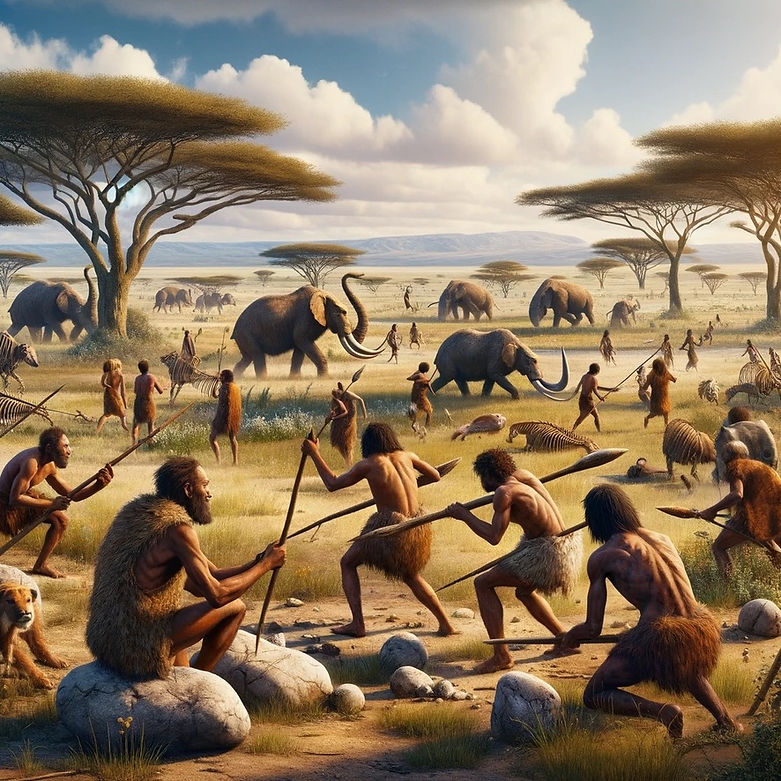

Facultative Carnivore Reasons
This database provides evidence for a hypothesis that humans evolved into facultative carnivores, a type of omnivore that thrives off an all-meat diet, but can survive on fallback foods like gathered plants. We would expect a roughly herbivorous diet with our Last Common Ancestor of Chimpanzees, between 6-10 million years ago. It may have been somewhat bipedal and somewhat arborial. What caused it to evolve to have some many different charactistics compared to other apes? One possibility is that early humans hunted small prey in forests and scavenged for meat on savannahs, increasing the amount of animal protein and fat in their diets. Perhaps persistence running played a role in allowing us to capture megafauna that run away, while tool enhancement, traps, and cooperation allowed us to capture and eat the largest megafauna. We may have targeted the "prime adults" at best seasonal opportunity when animals are known to carry more fat. We could characterize ourselves as omnivores, facultative carnivores, carnivores, apex carnivores, lipivores who nutritionally thrive on a high-fat (60-85% calories), moderate protein (15-35% calories), zerocarb (less than 5% calories, as low as 0 grams/day), zero fiber (0 grams/day), low linoleic acid (2-5% total calories), high omega balance ( total n-3 pufa / total pufa * 100).
However, we do find evidence of increasing plant consumption, especially since the dawn of agriculture, which have led to certain genetic changes that may have made us better omnivores than facultative carnivores. That said, the bulk of our evolution history appears to be under a carnivorous context, so using carnivore diets today may lead to fewer evolutionary mismatches. So the hypothesis is focused on hypercarnivorous diets that led to the best health, whereas hypocarnivorous diets allow survivability, but increase chronic disease in various ways, and have become necessary as megafauna access was wiped out over thousands of years.
Topics: Genetics, Human Evolution, Comparative Anatomy, Animal Fat, Megafauna, Hunting, Stone Tools, Nutrition, Saturated Fat
For a more recent but also more general view of this evidence, subscribe to:
https://www.reddit.com/r/Meatropology
Click on the Red buttons to open more information about the reason, including a details section with important parts of science papers that allude to the hypothesis.
the-intestines
Title:
Intestines - general theory
Abstract:
Summary of evolutionary changes in the human gut
Hypothesis
I think this section could be written to favor FC much more strongly.
I'm curious - what are the benefits of the microbiome? Create necessary vitamins and nutrients and short chain fatty acids? Reduce inflammation? Process toxic compounds from diet? Prevent intestinal permeability?
I'd like to see the microbiome compared with more omnivores and carnivores - and see if ape microbiomes also change with all-meat-based diets as we would expect they would - but not as much to some beneficial degree as humans.
I'd be especially interested to see if all-meat diets 'ruin' ape guts or create some sort of chronic disease. That would mean humans evolved to handle more meat.
rapidly-and-reliably
Title:
Animal based diet rapidly and reproducibly changes human gut microbiome
Abstract:
Study shows difference between plant based and animal based diet but hard to say which is really better
Hypothesis
I like this study because it shows very clear measurable differences and it shows how anti-meat bias makes them search diligently for a link between meat and intestinal problems. Since they consider their model microbiome diet to be a fairly low fat plant based bad-at-hunting-gatherer - they already think the meat is causing microbiome problems (and not the sugar).
I'd like to see better questions explored with better studies - but this is a good start.
human-predatory-pattern
Title:
Human Predatory Pattern
Abstract:
Origins of the Human Predatory Pattern: The Transition to Large-Animal Exploitation by Early Hominins
Hypothesis
If humans were able to hunt and kill large fatty megafauna - we can ask whether they ate only those animals instead of depending on plants. This paper describes the conservative beginnings of what could be the facultative carnivore argument.
b12-ileum
Title:
B12 Absorbed in Ileum - Required in diet from meat
Abstract:
The ileum is the major site of absorption of vitamin B12 analogues
Hypothesis
Digestion is a complicated system especially for absorbing Vitamin B12 - so we may be able to uncover better pathways by which humans evolved to absorb B12 from meat and use that to fuel higher fat burning and thinking. We might expect to see digestive enzymes related to B12 differ in measurable ways from other apes.
infant-brain-development
Title:
Infant Brain Development
Abstract:
[Survival of the fattest: the key to human brain evolution]
Hypothesis
We'd expect ketogenic children to be the most attentive, most intelligent, most healthy, best natural weight.
We'd expect high fat diets to help children.
We'd expect children to return to ketosis quicker than adults.



